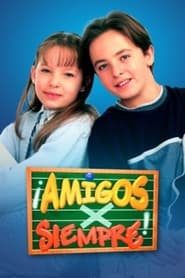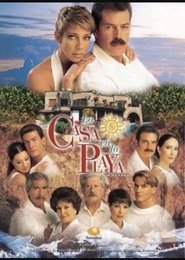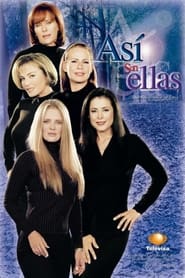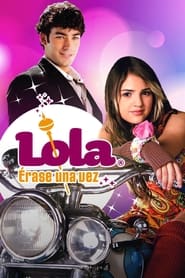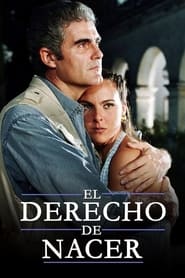Las Estrellas TV Series - Page 8
-
Falling in love with Ramón
2017
star 8Fabiola's parents are killed in a plane crash leaving her and her younger sister, Andrea, orphans. Their parents estate is divided equally among the girls. But at the reading of the will, the family is surprised to learn of the existence of a life insurance policy for one million dollars. They're even more surprised when they learn who the sole beneficiary of that policy is. While the family squabbles over what to do about the policy, Fabiola decides she's going to take over the administration of her family's business: a successful garage, where she finds more than she bargained for when she meets a mechanic named Ramon who just happens to be the son of her long-time nanny, Juana. It is based on the Venezuelan telenovela written by Doris Seguí, "Tomasa Tequiero" produced in 2009. -
Friends 4 Ever
2000
star 6.3The story is set at a prestigious, but rigid and repressive school called Instituto Vidal. Its strict owner, Julia Vidal, was once kind but has now turned into a bitter woman following the death of her husband and her daughter, Lauriel. Her granddaughter, Ana, a very sweet and intelligent 10 year old, also has been affected by the death: She has been rendered virtually speechless by the trauma, though she expresses herself through music and possesses an extraordinary ability to move objects with her mind. Ana's unscrupulous father, Francisco Capistrán, however, has taken advantage of the situation to try to steal Julia's school. The timely arrival of Ana's uncle, Salvador, Amanda and her adopted son changes everything. Ana’s sad and lonely life takes an unexpected turn for the better and she regains her joy in a series of adventures bursting with humor, excitement, music and thrilling surprises. -
Overcoming heartbreak
2020
star 7.6Four women of different ages and social strata are forced to live together under the same roof. At first, the coexistence between them is complicated and tense due to their different visions and ways of facing life, but little by little the sisterhood and solidarity prevail when realizing the peculiar bond that exists between them: each one has suffered, in one or otherwise, the absence and abandonment of their respective partners. -
Italian Bride
2014
star 5.6Muchacha italiana viene a casarse is a 1971 Mexican telenovela by Televisa produced by Ernesto Alonso and directed by Alfredo Saldaña, starring Angélica María and Ricardo Blume. Writing credits belong to Delia González Marquez, Fernanda Villeli, Marissa Garrido, Miguel Sabido and Carlos Lozano Dana The series featured two theme songs: "A dónde va nuestro amor" and "Lo que sabemos del amor". Both songs were written by Eduardo Magallanes and performed by Angélica María. -
Los Exitosos Perez
2009
Los Exitosos Perez
2009
Los Exitosos Perez is the adaptation for Mexico of the Argentine telenovela Los Exitosos Pells. It's a co-production of Endemol and Telefe. Mexican producer José Alberto Castro acts as it executive producer. With a mixed cast of mostly Mexican and Argentinian actors, and a few from other nationalities, it was filmed on location in Argentina, in exactly the same sets used in the original Argentinian counterpart. It premiered in Mexico on 31 August 2009 on the Televisa network. -
Despertar Contigo
2016
star 7.1Destiny brings two youngsters together in the middle of a flower show whose love story begins as soon as they meet. Maia and Pablo come from different social classes: Maia is Othón’s daughter, one of the most important entrepreneurs in the flower growing industry, while Pablo belongs to the bodyguard squad escorting Antonia, Othón’s biggest opponent… two people holding a lot of grudge. Antonia and Othón met at a young age and they don’t miss any chance to hurt each other, so when the confusing encounter between Maia and Pablo takes place, Antonia uses that ‘holy gift’ to fool the girl by telling her Pablo is one of the most important flower-growers in the country... a lie that is not intended to hurt Maia, to whom is irrelevant whether Pablo has money or not, but Othón instead, a nouveau riche with no class who wants his daughter to marry a wealthy man and would be ov -
Lola… Once Upon a Time
2007
star 7.9Lola... Érase Una Vez is a teen targeted Mexican melodrama telenovela produced by Televisa that is an adaptation of the Argentine global phenomenon and teenage telenovela Floricienta. The show tells the story of a modern Cinderella, Lola, a 20 year old girl, who works as a nanny and sings in a rock band and meets her so call Prince Charming. It debuted in Mexico on February 26, 2007, starring Aarón Díaz and Eiza González. The show had gained popularity among teens and children not only in Mexico but also internationally including Venezuela, Spain and the in United States. With concert performances filling major auditoriums and songs by the protagonist become radio hits. It debuted in the United States on Univision in March 2008 and ended on January 26, 2009. The series consisted of 224 episodes which aried Monday through Friday at 3 P.M, intentionally for teenagers to watch after school, as is typical for most teenage & children telenovelas in Spanish networks. -
El derecho de nacer
2001
star 2El Derecho de Nacer is a Mexican telenovela that was produced by Televisa and broadcast on El Canal de las Estrellas from 5 February 2001 to 25 May 2001. A remake of the popular 1981 telenovela of the same name, it stars Kate del Castillo and Saúl Lisazo. -
I Dare You to Leave
2015
star 7.6A heartbreaking story in which power, obsession, and desire will tragically mark the love between Paulina and Adrián who will fight for their love against all odds, even if it takes their life. -
The Stray Cat
2014
star 7.4La Gata is an upcoming Mexican telenovela to be produced by Nathalie Lartilleux for Televisa. It is a remake of the Venezuelan telenovela La Gata, produced in 1968 and Mexican telenovela Rosa Salvaje produced in 1987. -
True Love
2012
star 7.7Amores verdaderos is a 2012 Mexican telenovela produced by Nicandro Díaz Gonzalez for Televisa. It is based on Amor en Custodia, produced in Colombia, Argentina, and Mexico. -
I love you, Güero
2020
star 7.7“La mexicana y el güero” is the story of some scammers who try to deceive a millionaire who is looking for his biological mother through a plan that is funny about what is complicated. Itatí Cantoral, Gala Montes, Juan Soler, Luis Roberto Guzmán, Montserrat Marañón, Jacqueline Andere, Rodrigo Abed and Laura Vignatti, among many other stars. -
Minas de Pasión
2023
star 7.4Emilia a single mother who works in a mine fall in love with Leonardo the son of Roberta Castro the most powerful of the people. Roberta will seek revenge on Emilia by making her life miserable. -
Contra viento y marea
2005
star 7.2Contra viento y marea is a Mexican telenovela aired from April 25 until November 4, 2005. This was also the last acting role of Beatriz Sheridan, who died in 2006 of a heart attack. -
Carrusel
1989
star 7.7Carrusel is a Mexican telenovela, produced by and first broadcast on Televisa in 1989. It covers daily life in a Mexican elementary school and the children's relationships with a charismatic teacher named Jimena. Among other plot devices, it deals with the differences between the upper and lower classes of Mexican society — specifically as seen in a romantic relationship between Cirilo, a poor black boy, and a spoiled rich girl, Maria Joaquina Villaseñor.

